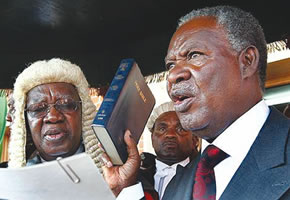Zambia’s kwacha slides
Michael Sata, a fierce critic of foreign mining investment, especially from China, won a surprise election victory.
Traders said the currency of Africa’s biggest copper producer, which fell 2 percent early last Friday, was likely to remain on the back foot until Sata provided clarity on his economic policies. He said last week he would maintain strong commercial and diplomatic ties with China and would not introduce a minerals windfall tax. He also implied he might impose some form of capital controls to keep dollars in the country.
“Right now there’s a bit of uncertainty about what changes in policy we’re going to see with Sata,” said Coura Fall, an Africa analyst at Citi in Johannesburg.
“The kwacha will continue to be vulnerable, at least until there’s clarity about what’s going to happen. Everybody is trying to see what Sata is really about.”
Other factors weighing on the kwacha are a 17 percent decline in the last three weeks in the price of copper, which accounts for 80 percent of Zambia’s export revenue, and a broad flight from risky emerging and frontier market assets due to mounting concerns about global economic prospects. Sata was sworn-in last Friday, only hours after the declaration of his election victory over incumbent Rupiah Banda, whose Movement for Multi-party Democracy had run the Southern African country since the end of one-party rule in 1991.
Zambia’s central bank has tended to intervene to support the currency whenever it has neared 5 000, and traders said it was active in the week before the election, selling dollars to push the unit to a month high of 4 770 on September 20. Before the election, Banda’s administration had been planning to launch a debut US$500 million Eurobond to cash in on appetite among foreign investors for high-yielding frontier African debt. – Reuters.








Comments